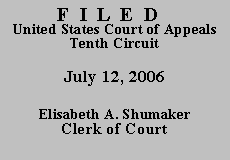 UNITED STATES COURT OF APPEALS
UNITED STATES COURT OF APPEALS
 UNITED STATES COURT OF APPEALS
UNITED STATES COURT OF APPEALS
FOR THE TENTH CIRCUIT
| KEVIN M. JONES,
Petitioner-Appellant, v. E.J. GALLEGOS, Warden, USP-Leavenworth, Respondent-Appellee. |
|
The petitioner appeals the dismissal by the United States District Court for the District of Kansas of his petition for writ of habeas corpus filed pursuant to 28 U.S.C. § 2241. We affirm.
In the petition filed in the district court, the petitioner challenged his drug and firearms convictions and the resulting sentence entered by the United States District Court for the District of Nebraska. He alleged that: 1) his guilty plea was not knowing and voluntary; 2) false testimony was presented to the grand jury which issued the indictment; 3) he was denied effective assistance of counsel; 4) the prosecution engaged in misconduct; 5) he was denied due process, and 6) he is actually innocent. The district court dismissed.
Normally, "'[a] petition under 28 U.S.C. § 2241 attacks the execution of a sentence rather than its validity and must be filed in the district where the prisoner is confined. A 28 U.S.C. § 2255 petition attacks the legality of detention, and must be filed in the district that imposed the sentence.'" Haugh v. Booker, 210 F.3d 1147, 1149 (10th Cir.2000) (quoting Bradshaw v. Story, 86 F.3d 164, 166 (10th Cir.1996)). Section 2241 "is not an additional, alternative, or supplemental remedy to 28 U.S.C. § 2255." Bradshaw, 86 F.3d at 166. Only if the petitioner shows that § 2255 is "inadequate or ineffective" to challenge the validity of a judgment or sentence may a prisoner petition for such a remedy under 28 U.S.C. § 2241. Id. "Failure to obtain relief under § 2255 does not establish that the remedy so provided is either inadequate or ineffective." Id. (quotation omitted).
The petitioner has not established the inadequacy or ineffectiveness of 28 U.S.C. § 2255.
Accordingly the judgment of the district court is AFFIRMED. The mandate shall issue forthwith.
Entered for the Court
Per Curiam
*. This order and judgment is not binding precedent, except under the doctrines of law of the case, res judicata and collateral estoppel. The court generally disfavors the citation of orders and judgments; nevertheless, an order and judgment may be cited under the terms and conditions of 10th Cir. R. 36.3.